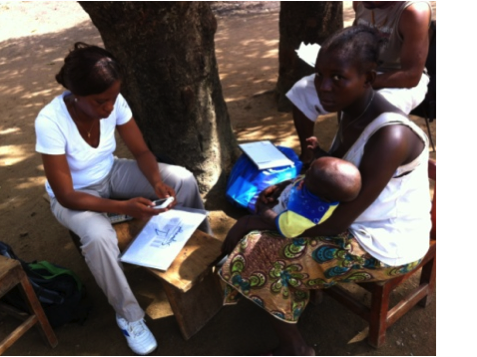Hi, my name is Or Dashevsky, Chief Solution Architect for Catholic Relief Services based in Baltimore. I’m responsible for providing technical leadership to a team who develop CRS’ enterprise architecture.
Malaria is endemic in Sierra Leone, with stable and perennial transmission in all parts of the country. As such, the entire population is at risk of developing the disease. Malaria accounts for about 50% of outpatient morbidity and is presently the leading cause of morbidity and mortality among children under five years of age, with a mortality attributed to malaria estimated to be 38% among this age group and 25% for all ages (Outpatient morbidity statistics, MoHS, 2009, MIS 2010).
Catholic Relief Services (CRS) and the Ministry of Health and Sanitation (MoHS) of Sierra Leone are co-implementing a Global Fund project to fight AIDS, Tuberculosis, and Malaria (Global Fund Round 10). The overall goal of the Global Fund Round 10 Malaria project is to achieve the malaria-related Millennium Development Goals (MDGs) by 2015, not only nationally, but also among the poorest groups across Sierra Leone.
In order to track progress and impact, CRS led the implementation of a Malaria Indicator Survey (MIS) from 31 January – 8 March 2013 covering 6,720 households throughout the country. Despite the great surge of mobile technologies to accelerate data collection, all surveys prior to this were using paper-based systems in Sierra Leone. The 2013 MIS used Apple 3GS iPhones to collect data via the iFormBuilder platform, a Software as Services application allowing for timely data collection, monitoring, and analysis.
Lessons Learned:
- Allow enough time to digitize paper questionnaires: It took approximately 9 weeks of intense programming and testing over a 10-month period to program the MIS questionnaire into iFormBuilder.
- Allow enough time to pre-test: The tool was pre-tested in 100 households in both rural and urban areas three months prior to the start of MIS data collection.
- Spend enough time on training enumerators prior to data collection: Data collection training for 28 teams lasted three weeks, which was necessary to ensure that all individuals collecting MIS data fully understood the questions, the functioning of iPhones, and the sequencing and logic of the questionnaires
- Provide central technical support throughout data collection effort: Throughout data collection, a CRS Freetown-based team was available 16 hours a day to respond to phone calls from the field teams, especially during the first 10 days of fieldwork. This allowed for real-time review of data and timely corrections.
Hot Tip: Digital data collection will improve timelines and accuracy of the data. It may look more expensive than traditional paper-base systems but in reality cost of digital data collection can be less in the long run.
The American Evaluation Association is celebrating Information and Communication Technology for Development (ICT4D) for Monitoring, Evaluation, Accountability and Learning (MEAL) week. The contributions all this week to aea365 come from members who work in ICT4D for MEAL. Do you have questions, concerns, kudos, or content to extend this aea365 contribution? Please add them in the comments section for this post on the aea365 webpage so that we may enrich our community of practice. Would you like to submit an aea365 Tip? Please send a note of interest to aea365@eval.org. aea365 is sponsored by the American Evaluation Association and provides a Tip-a-Day by and for evaluators.
